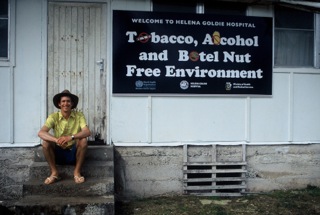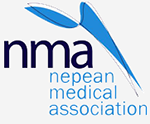2014
The Nepean Medical Association scholarship allowed me to travel to Helena Goldie Hospital (HGH) in the Solomon Islands. HGH is a second level care hospital with 68 beds, medical, paediatric and obstetric wards and primary care coordination centre. HGH serves a population of over 26,000 widely dispersed along the Western Province archipelago.
My time at HGH was an extremely busy and encompassed Christmas and New Year. The hospital was in the process of reducing its medical staff from four to two doctors. An obstetrician/gynecologist and paediatrician, were returning home to India after eleven years at HGH. While two general practitioners from the United Kingdom, having been in the Solomon Islands for four years, were to continue on. On arrival I was asked how I intended to approach the elective – whether I was more interested in the beach and diving or if I was willing to be woken at all hours and for all procedures. I heartily endorsed the latter. I had many chances to ponder that choice – the days were long, often very hot and nights were frequently disrupted. Indeed on my first night I was woken for an umbilical cord entanglement emergency, and hence a perineal tear repair. During my four weeks I think I had four days out of the hospital. However I do not regret throwing everything into my stay.
Healthcare in the developing world is frequently portrayed in the media as principally a lack of medications. Whilst this was often true at HGH (we had significant shortages of intravenous antibiotics, analgesics and anaesthetics) the limitation I felt most acutely was that of investigations. The tools at our disposal were X-Ray, ultrasound, point-of-care tests, and a laboratory with a microscope. Having gone through medical school where there is always ‘an answer’ to clinical conundrums – either at the end of the problem based learning activity or from a senior doctor, I initially found the uncertainty very disconcerting. I felt helpless in the face of very sick patients, particularly those with apparent kidney dysfunction or fever of unknown origin. Patients like these caused me to spend many hours in the ancient (but ideal) collection of textbooks. The dearth of diagnostic tools also forced me to spend more time with patients concentrating on symptoms and signs, but also gave me an opportunity build upon my undergraduate and postgraduate laboratory experience. This experience only increased my admiration of what Manson, Laveran, Ross and Pasteur (to name a few) achieved with simple tools and similar stringent conditions. In the end it was reassuring to see that with diligent care and excellent nursing how well our patients performed.
The paucity of investigative and therapeutic options could lead to rather paradoxical feelings. For example, LM, a 55 year old female presented with confusion, clumsiness, a cough, and occasional low grade fevers. A neurological exam and skull X-ray were normal and no other clinical signs were evident. After she showed no improvement with supportive care Dr Jenny and I discussed meningeal TB. Her chest X-Ray showed a very mild left lower lobe opacity. On examining her sputum we were delighted to see acid-fast bacilli – delighted because quadruple therapy for TB is provided by the WHO free of charge and in relatively abundant supply.
On free evenings from HGH I would borrow a dugout canoe and paddle out to some of the islands with a couple of friends. The lagoon is incredibly beautiful, the water is warm and the snorkeling and surfing are spectacular. This was also a good chance to understand something of the connection of Solomon Islanders with the sea. Although high calorie Western style foods are available from the shops in town, most families still rely on the ocean to provide their protein. It was therefore hard to listen to stories about overfishing and how the seas were rapidly depleted by foreign trawlers during the years of internal conflict. Travelling in this way gave me a better perception of the distance many of our patients had to travel in order to reach us.
An elective in the Solomon’s was a tremendously rewarding experience and I am extremely grateful for the support of the NMA. I believe a learnt a great deal, both medically and personally. I hope to return to the Solomon Islands in due course and repay something of the kindness and hospitality I was shown during my stay.






